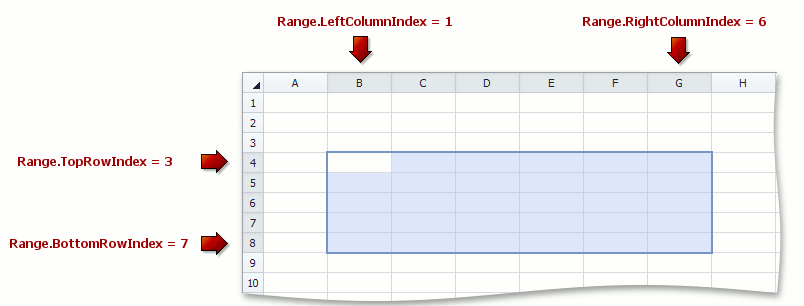IRangeProvider.FromLTRB(Int32, Int32, Int32, Int32) Method
Returns a cell range by the indexes of the bounding rows and columns.
Namespace: DevExpress.Spreadsheet
Assembly: DevExpress.Spreadsheet.v24.2.Core.dll
NuGet Package: DevExpress.Spreadsheet.Core
Declaration
CellRange FromLTRB(
int leftColumnIndex,
int topRowIndex,
int rightColumnIndex,
int bottomRowIndex
)Parameters
| Name | Type | Description |
|---|---|---|
| leftColumnIndex | Int32 | An integer that is the zero-based index of the left column. |
| topRowIndex | Int32 | An integer that is the zero-based index of the top row. |
| rightColumnIndex | Int32 | An integer that is the zero-based index of the right column. |
| bottomRowIndex | Int32 | An integer that is the zero-based index of the bottom row. |
Returns
| Type | Description |
|---|---|
| CellRange | A CellRange object. |
Remarks
Get the IRangeProvider object via the Worksheet.Range property and use the FromLTRB method to access a cell range restricted by the specified rows and columns.

To access a cell range by its reference string, use the IRangeProvider.Item property or IRangeProvider.Parse method.
Example
The table below describes how to access a cell range in a worksheet.
Task | Use one of the following members |
|---|---|
Access a cell range by its reference in the A1 style or name. | |
Access a cell range by its reference in the R1C1 style. | |
Access a cell range by row and column indexes. | |
Create a union cell range. | |
Access subranges of a union cell range. |
using DevExpress.Spreadsheet;
// ...
Workbook workbook = new Workbook();
Worksheet worksheet = workbook.Worksheets[0];
// A range that includes cells from the top left cell (A1) to the bottom right cell (B5).
CellRange rangeA1B5 = worksheet["A1:B5"];
// A rectangular range that includes cells from the top left cell (C4) to the bottom right cell (E7).
CellRange rangeC4E7 = worksheet.Range["C4:E7"];
// The C4:E7 cell range located in the "Sheet3" worksheet.
CellRange rangeSheet3C4E7 = workbook.Range["Sheet3!C4:E7"];
// A range that contains a single cell (E7).
CellRange rangeE7 = worksheet.Range["E7"];
// A range that includes the entire column A.
CellRange rangeColumnA = worksheet.Range["A:A"];
// A range that includes the entire row 5.
CellRange rangeRow5 = worksheet.Range["5:5"];
// A minimal rectangular range that includes all listed cells: C6, D9 and E7.
CellRange rangeC6D9E7 = worksheet.Range.Parse("C6:D9:E7");
// A rectangular range whose left column index is 0, top row index is 0,
// right column index is 3 and bottom row index is 2. This is the A1:D3 cell range.
CellRange rangeA1D3 = worksheet.Range.FromLTRB(0, 0, 3, 2);
// A range that includes the intersection of two ranges: C5:E10 and E9:G13.
// This is the E9:E10 cell range.
CellRange rangeE9E10 = worksheet.Range["C5:E10 E9:G13"];
// Create a defined name for the D20:G23 cell range.
worksheet.DefinedNames.Add("Range_Name", "Sheet1!$D$20:$G$23");
// Access a range by its defined name.
CellRange rangeD20G23 = worksheet.Range["Range_Name"];
CellRange rangeA1D4 = worksheet["A1:D4"];
CellRange rangeD5E7 = worksheet["D5:E7"];
CellRange rangeRow11 = worksheet["11:11"];
CellRange rangeF7 = worksheet["F7"];
// Create a complex range via the Range.Union method.
CellRange complexRange1 = worksheet["B7:C9"].Union(rangeD5E7);
// Create a complex range via the IRangeProvider.Union method.
CellRange complexRange2 = worksheet.Range.Union(new CellRange[] { rangeRow11, rangeA1D4, rangeF7 });
// Create a complex range from multiple cell ranges separated by commas.
CellRange complexRange3 = worksheet["D15:F18, G19:H20, I21"];
// Fill the ranges with different colors.
complexRange1.FillColor = Color.LightBlue;
complexRange2.FillColor = Color.LightGreen;
complexRange3.FillColor = Color.LightPink;
// Use the Areas property to get access to a complex range's component.
complexRange2.Areas[2].Borders.SetOutsideBorders(Color.DarkGreen, BorderLineStyle.Medium);
Related GitHub Examples
The following code snippets (auto-collected from DevExpress Examples) contain references to the FromLTRB(Int32, Int32, Int32, Int32) method.
Note
The algorithm used to collect these code examples remains a work in progress. Accordingly, the links and snippets below may produce inaccurate results. If you encounter an issue with code examples below, please use the feedback form on this page to report the issue.